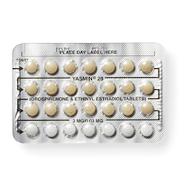5 myths about the pill, busted
The pill is still the most popular birth control method in the U.S.—and it’s still the subject of all kinds of crazy rumors.

It’s hard to think of any medicine that has changed the United States as much as the birth control pill. (It’s known as just “the pill” for crying out loud! Just as deserving of one-name status as Madonna.) Since the pill hit the market in 1960, it’s been used by millions of people to help them choose when or if they become pregnant. And it’s the #1 birth control method used in the U.S.
Whether you’ve used the pill or not, you’ve probably heard lots of rumors and stories about what it does and doesn’t do. And even if you have first-hand experience with the pill, it can be hard to separate the truth from the nonsense.
Here are the top 5 misunderstandings, myths, and outright lies we’ve heard about the birth control pill.
Myth 1: Birth control pills make you gain weight.
This is one of the most common worries patients have (so common that Bedsider has two articles on the subject). But the truth is that dozens and dozens of studies about this show that on a population level, taking modern birth control pills does NOT cause weight gain. Anyone who tells you that weight gain always happens as a “side effect” of birth control pills definitely isn’t up to date!
So if all this research doesn’t back it up, then why does this rumor stick around? Part of the reason might be because the old formulas in the very first birth control pills had much higher levels of hormones than the modern versions and sometimes made people feel bloated. Another reason might be that we humans naturally tend to gain weight as we get older, averaging about 1-2 pounds every year as we age.
That being said, while research shows that women taking the pill don’t gain any more weight on average than women not on the pill, every body is different. You know your body better than anyone, so don’t put up with a birth control method you feel is affecting you in a negative way! Talk to your provider about your other birth control options.
Myth 2: The pill affects your mood, or even your personality.
This is a particularly hard myth to figure out. It’s tricky to do good research about mood, since so many things in our lives can affect how we feel from day to day (and how we report it to a researcher). There are lots of personal anecdotes in online forums about the pill affecting people’s moods or making them “crazy,” but the best quality research doesn’t show much effect on a population level. Overall, it seems like most people report either no change or a slightly more positive mood after starting the pill. In fact, for women who report severe mood swings with the natural rise and fall of their monthly hormones, the pill is sometimes prescribed as treatment!
On the other hand, a recent study found that certain hormonal birth control methods may cause a slight increase in depression. Interpreting this research is complex, but here’s the bottom line: you know your body best. Especially if you have a history of mood disorders like depression or anxiety, it’s important to keep an eye on your mood symptoms when taking the pill. If you don’t like how you feel with your birth control method, don’t settle. Even a different formulation of the pill could work better for you, so feel free to talk with your provider about trying different options.
Myth 3: The pill makes you infertile.
This one’s not just wrong, it’s dangerous—sometimes people hear this myth and think there’s some sort of “grace period” when they can’t get pregnant even though they stopped taking their pills.
The truth is that decades of research have shown that birth control pills don’t affect fertility. Unless you’re using some other type of birth control, your baby-making system is gonna come back online almost immediately after stopping the pill. Even for patients taking birth control pills continuously (without a break for periods), their periods come back an average of only 32 days after stopping the pill.
Myth 4: The pill causes abortions.
Sometimes in the constant debate in this country over abortion and birth control, patients can get the impression that birth control pills can cause abortions if taken by a pregnant woman.
Not only do birth control pills NOT cause abortion, they don’t even affect a developing fetus if taken by a pregnant woman. A pregnancy that’s already established won’t be harmed or aborted by taking the pill. That is, once an egg is fertilized and implanted in the uterus, birth control pills have zero (Zilch! Nada!) effect on the pregnancy.
So that’s the skinny! Whether the pill is the right birth control method for you depends on lots of stuff, from your health to lifestyle to personal preferences. But now you know that it SHOULDN’T depend on any of the myths above. Spread the word!
How do you feel about this article?

Heat up your weekends with our best sex tips and so much more.
